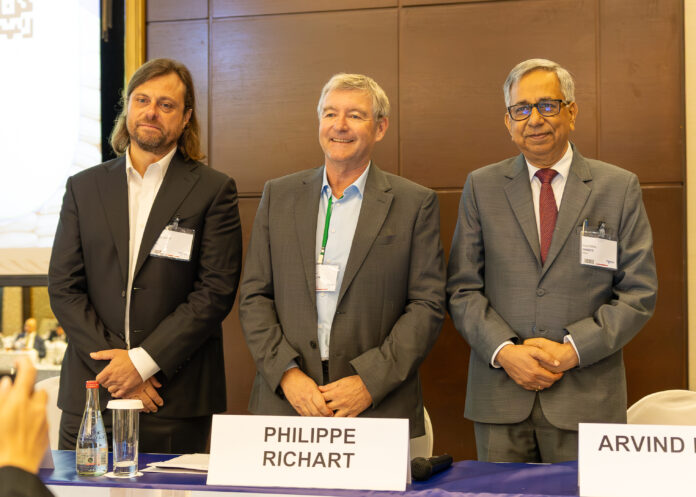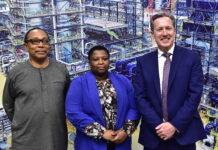Dangote Cement Promotes Sustainable Shift in Africa’s Distribution Value Chain
… invests in low-carbon logistics and digital transformation
Dangote Cement Plc has once again demonstrated its lead in driving sustainable transformation across Sub-Saharan Africa’s cement value chain, with its Group Managing Director, Mr Arvind Pathak, reaffirming the company’s commitment to innovation and responsible growth at the 14th Africa CemTrade Summit in Accra, Ghana.
Speaking on the theme “Sustainable Innovation in the Sub-Saharan Africa Cement Distribution Value Chain,” Pathak said Dangote Cement’s business model places sustainability at the heart of its operations, from production to logistics, combining profitability with environmental stewardship.
“Sustainability has never been an afterthought for us; it is central to how we grow, innovate, and operate,” he stated. “For Africa’s industrial future to remain viable, sustainability must make economic sense. Our strategy ensures profitability while protecting the planet and creating decent jobs for our people.”
Over the past two decades, Dangote Cement has expanded from a local producer into a continental leader, operating in eleven countries with an installed capacity of 55 million tonnes per annum. Beyond scale, Pathak said, the company’s distinction lies in its deliberate shift towards lower-carbon operations, contributing to Africa’s sustainable industrialisation.
He revealed that Dangote Cement has co-processed over 1.5 million tonnes of alternative fuels since 2021, converting industrial, agricultural, and municipal waste into energy. He noted that the use of alternative fuel forms part of the company’s broader decarbonisation strategy aimed at cutting carbon emissions by twenty per cent by 2030. Other strategies are energy-efficient technologies and nature-based carbon-offset.
The company has also deployed 15 alternative fuel systems across its plants, achieving up to 40 per cent thermal substitution in operations across Senegal, Zambia, and South Africa.
“We recognised early that sustainability would define the future of manufacturing,” he added. “Our investments in process optimisation, cleaner fuels, and advanced energy systems reduce waste, improve efficiency, and strengthen competitiveness.”
A major highlight of the company’s green transition is its investment in compressed natural gas (CNG)-powered logistics. With over 3,000 CNG-powered trucks and 1,000 dual-fuel vehicles in operation, Dangote Cement has reduced its emissions and transport costs significantly.
“We are proving that economic performance and climate responsibility can move together,” Pathak said. “Our goal is to transition to a fully CNG-powered fleet in Nigeria by 2026, cutting carbon emissions per unit of energy consumed by nearly 29 per cent.”
Dangote Cement’s sustainability strategy is further supported by its digital transformation drive, which has introduced systems such as the Distributor Management System (DMS), Transport Management System (TMS), and Electronic Proof of Delivery (e-POD), enhancing transparency, route optimisation, and supply chain efficiency.
The company has mapped more than 65,000 retail outlets in Nigeria and continues to expand across key regional trade corridors. Through its Customer Truck Empowerment Scheme (CTES), Dangote Cement has distributed over 4,000 trucks to transport partners, creating local employment and boosting reliability in cement delivery.
To demonstrate support for communities and people, the company in 2024 invested over N12.4 billion in community development projects across its host countries, a fourfold increase from the previous year, covering education, healthcare, infrastructure, and youth empowerment.
Mr Pathak reiterated that collaboration is central to achieving low-carbon industrialisation. Dangote Cement continues to play an active role in global and regional partnerships for sustainable construction as a founding member of the Global Cement and Concrete Association (GCCA) and a partner of the United Cities and Local Governments of Africa (UCLG Africa) to promote low-carbon cement standards, including the Limestone Calcined Clay Cement (LC3) initiative.
Dangote Cement’s Deputy Head of Sustainability, Dr Oyekemi Oyelola, sharing the sustainability initiatives that earned the business a B+ CDP rating in 2024, said the company’s business model demonstrates that industrial progress and environmental responsibility can coexist.
“Our mission is to ensure that Dangote Cement leads the transformation to fill the gap of Africa’s infrastructure deficit. The business achieves this through providing resilient building materials and supporting a resilient and greener future,” she said.






